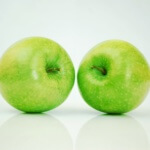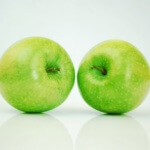 Apples are a nutritious snack; however, are the sugars and carbohydrates in an apple good or bad for blood sugar and insulin levels if a person has diabetes? According to the American Diabetes Association, although they contain sugars and carbohydrates, eating apples and other fruit is not a problem for a person with either type 1 or type 2 diabetes.
Apples are a nutritious snack; however, are the sugars and carbohydrates in an apple good or bad for blood sugar and insulin levels if a person has diabetes? According to the American Diabetes Association, although they contain sugars and carbohydrates, eating apples and other fruit is not a problem for a person with either type 1 or type 2 diabetes.
Apples contain a different kind of sugars compared to foods that have added sugars, plus, they contain fiber and other nutrients. Someone diagnosed with diabetes should be aware of how apples can affect them so they have no qualms about including this fruit in a diabetes-healthy diet.
Are Apples Ideal for People Who are Diagnosed with Diabetes?
People diagnosed with diabetes must watch out for their carbohydrate intake to make sure that their blood sugar levels stay stable throughout the entire day. It makes sense, then, to manage and monitor any foods that contains carbs and sugars.
Most of the sugar in an apple is in the form of naturally occurring fructose, however, and this may have a different effect on the body than other sugars. As mentioned earlier, fructose is different from refined and processed sugars found in packaged foods such as biscuits and chocolates.
A review posted in the American Journal of Clinical Nutrition found that replacing glucose or sucrose with fructose led to less sugar and insulin in the blood stream after a meal.
Furthermore, the US Department of Agriculture (USDA) reports that a medium apple contains around 4g of dietary fiber, and this may help slow sugar absorption in the body, which could help prevent spikes in sugar and insulin. So, is a green apple for diabetes good? Well, yes!
The Benefits of Apples
One medium apple contains around 100 calories, 25g of carbohydrates, and nearly 20% of the daily recommended value for fiber. The flesh and skin of apples contain water, vitamin A and C and other antioxidants and trace minerals.
People tend to feel full after eating apples due to the fiber, water, and other nutrients. This may be why many people enjoy this fruit as a quick snack to tide them over in between meals.
In addition, certain flavonoids found in a lot of apples, such as quercetin, can protect a person from diabetes. A study proved that eating apples is associated with a lowered risk of the disease.
Eating a varied diet rich in veggies and fruit, including apples, is good for everyone; however, it may be even more important for a person with diabetes, or one who’s at a higher risk for the disorder.
Diabetes and Other Fruits
A diet rich in veggies and fruits is beneficial for everyone, and certain fruits provide more benefits than others, especially for a person with a chronic health condition. Eating fruits raw provides the most benefits because when the fruit is processed, the fibers, antioxidants and other nutrients may be lowered.
Other fruits for diabetics: any fruit should be fine for a person diagnosed with diabetes, so long as they’re not allergic to said fruit. Experts recommend the following fruits for people who are using the glycemic index in their food choices:
- Avocado
- Bananas
- Mangos
- Papayas
- Kiwi
- Pineapple
A person should also monitor how different fruits affect their symptoms and blood sugar, as every person’s sensitivities may differ. For some, fruits that are higher in sugar might not need to limited or avoided, depending on how they affect blood sugar.
Overall Conclusion
So, how many apples can a diabetic eat per day? Well, apples are a highly nutritious food choice and can be a great snack. They should have a minimal effect on blood sugar and insulin levels, which makes them a perfect snack even for people with diabetes. So, feel free to have as many as you want!







